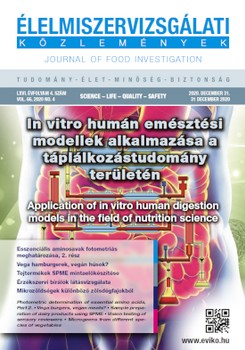Application of in vitro human digestion models in the field of nutrition science
Main Article Content
Absztrakt
Simulating digestion that takes place in the gastrointestinal tract is a widely used pro-cedure in various fields of food and nutrition science, as well as in the pharmaceuti-cal industry, as it is less costly and labor-intensive in human clinical trials and animal experiments, while not raising ethical issues either. The process of digestion converts nutrients and bioactive compounds in foods into physiologically active compounds. In vitro digestion models have been proved to be effective tools for the complete understanding and observation of the complex transformation processes that occur during digestion. Of course, in vitro studies cannot be substitutes for in vivo experiments, but they play a key role in the pre-screening, ranking and classification of samples before in vivo studies. In this article, we show why in vitro digestion models are important, how and in what systems they can be used. Several in vitro digestion models have been developed in static, dynamic and semidynamic forms. In this summary, we present the unified static model developed within the framework of the COST INFOGEST program, a unified, convention-based protocol for in vitro digestion of food samples prepared with the involvement of more than 200 researchers from 32 countries. The application of the unified model allowed the comparison of the results of different research groups.
Letöltések
Letölthető adat még nem áll rendelkezésre.
Article Details
Hogyan kell idézni
Antal, O., Némethné Szerdahelyi, E., & Takács, K. (2020). Application of in vitro human digestion models in the field of nutrition science. Élelmiszervizsgálati Közlemények, 66(4), 3150–3157. Elérés forrás https://eviko.gmf.u-szeged.hu/index.php/eviko/article/view/201
Folyóirat szám
Rovat
Fókuszban

